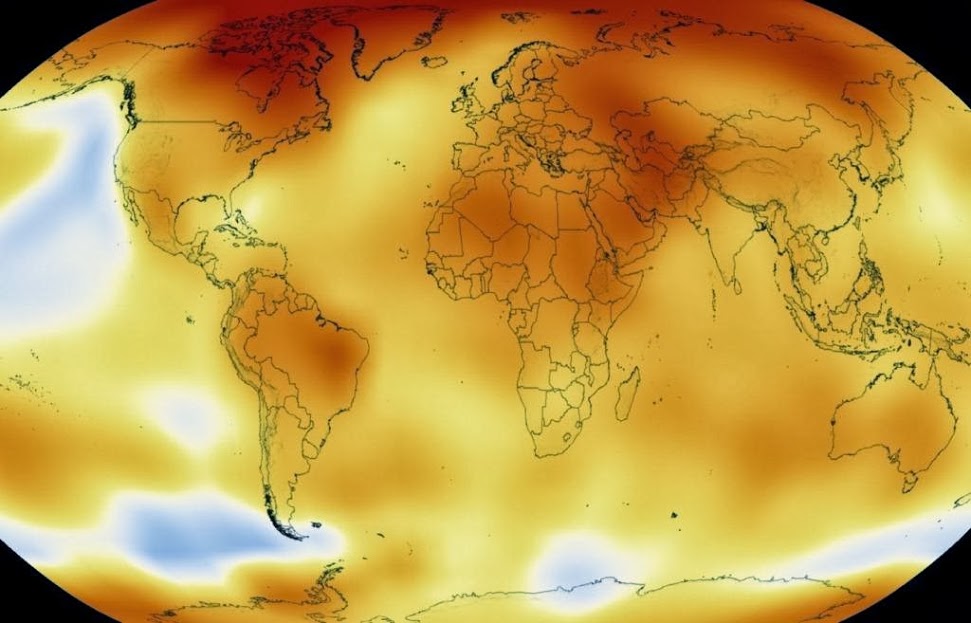
This visualization shows how global temperatures have risen from 1950 through the end of 2013/NASA/GSFC, GISS (See video below)
The signs of climate change are all around us, according to a new report just released by the White House.
The average temperature in the United States during the past decade was 0.8° Celsius (1.5° Fahrenheit) warmer than the 1901-1960 average, and the last decade was the warmest on record both in the United States and globally.
“Global sea levels are currently rising at approximately 1.25 inches per decade, and the rate of increase appears to be accelerating,” according to the report’s executive summary. “Climate change is having different impacts across regions within the United States.”
In the West, heat waves have become more frequent and more intense, while heavy downpours are increasing throughout the lower 48 States and Alaska, especially in the Midwest and Northeast. The scientific consensus is that these changes, and many others, are largely consequences of anthropogenic (human endured) emissions of greenhouse gases.
“The emission of greenhouse gases such as carbon dioxide (CO2) harms others in a way that is not reflected in the price of carbon-based energy, that is, CO2 emissions create a negative externality,” the report concludes. “Because the price of carbon-based energy does not reflect the full costs, or economic damages, of CO2 emissions, market forces result in a level of CO2 emissions that is too high. Because of this market failure, public policies are needed to reduce CO2 emissions and thereby to limit the damage to economies and the natural world from further climate change.”
There is a vigorous public debate over whether to act now to stem climate change or instead to delay implementing mitigation policies until a future date, the White House says.
This report examines the economic consequences of delaying implementing such policies and reaches two main conclusions, both of which point to the benefits of implementing mitigation policies now and to the net costs of delaying taking such actions.
First, although delaying action can reduce costs in the short run, on net, delaying action to limit the effects of climate change is costly.
“Because CO2 accumulates in the atmosphere, delaying action increases CO2 concentrations. Thus, if a policy delay leads to higher ultimate CO2 concentrations, that delay produces persistent economic damages that arise from higher temperatures and higher CO2 concentrations,” the report indicated. “Alternatively, if a delayed policy still aims to hit a given climate target, such as limiting CO2 concentration to given level, then that delay means that the policy, when implemented, must be more stringent and thus more costly in subsequent years. In either case, delay is costly.”
These costs will take the form of either greater damages from climate change or higher costs associated with implementing more rapid reductions in greenhouse gas emissions. In practice, delay could result in both types of costs. These costs can be large:
Based on a leading aggregate damage estimate in the climate economics literature, a delay that results in warming of 3° Celsius above preindustrial levels, instead of 2°, could increase economic damages by approximately 0.9 percent of global output. To put this percentage in perspective, 0.9 percent of estimated 2014 U.S. Gross Domestic Product (GDP) is approximately $150 billion. The incremental cost of an additional degree of warming beyond 3° Celsius would be even greater.
“Moreover, these costs are not one-time, but are rather incurred year after year because of the permanent damage caused by increased climate change resulting from the delay,” the report says.
An analysis of research on the cost of delay for hitting a specified climate target (typically, a given concentration of greenhouse gases) suggests that net mitigation costs increase, on average, by approximately 40 percent for each decade of delay. These costs are higher for more aggressive climate goals: each year of delay means more CO2 emissions, so it becomes increasingly difficult, or even infeasible, to hit a climate target that is likely to yield only moderate temperature increases.
Second, climate policy can be thought of as “climate insurance” taken out against the most severe and irreversible potential consequences of climate change. Events such as the rapid melting of ice sheets and the consequent increase of global sea levels, or temperature increases on the higher end of the range of scientific uncertainty, could pose such severe economic consequences as reasonably to be thought of as climate catastrophes.
“Confronting the possibility of climate catastrophes means taking prudent steps now to reduce the future chances of the most severe consequences of climate change,” the report says. “The longer that action is postponed, the greater will be the concentration of CO2 in the atmosphere and the greater is the risk. Just as businesses and individuals guard against severe financial risks by purchasing various forms of insurance, policymakers can take actions now that reduce the chances of triggering the most severe climate events.”
And, unlike conventional insurance policies, climate policy that serves as climate insurance is an investment that also leads to cleaner air, energy security and benefits that are difficult to monetize like biological diversity.













